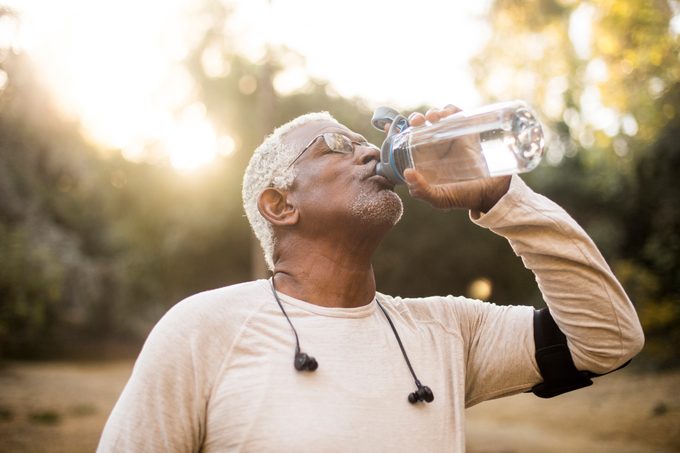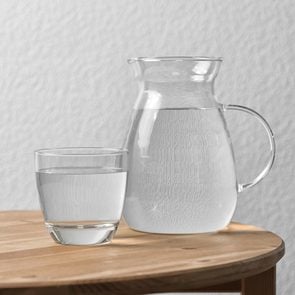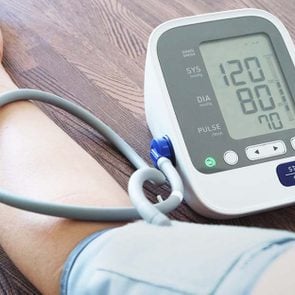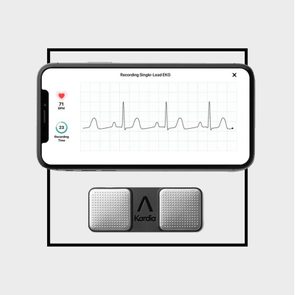Can Dehydration Cause High Blood Pressure? What Experts Say
Updated: Oct. 10, 2022
Dehydration may cause your blood pressure to rise or fall, but drinking enough water can stave off the effects of dehydration.
The link between dehydration and blood pressure
Dehydration can sometimes cause low blood pressure that can lead to fainting, but not drinking enough water also can result in high blood pressure if you’re not careful.
High blood pressure is when the force of blood against your artery walls is too high when your heart beats. If left untreated, this force can damage the blood vessels and cause heart disease, stroke, kidney failure, and/or vision problems over time.
Systolic blood pressure, the upper number in a blood pressure measurement, is how much pressure your blood is exerting against your artery walls when your heart is beating. Diastolic blood pressure, the lower number, is the pressure when your heart is resting between beats. A blood pressure of less than 120/80 mm Hg is considered normal.
There are many causes of high blood pressure, including genetics, eating an unhealthy diet loaded with salt, being overweight, and not getting enough exercise.
Dehydration may also be on this list, says Mark Conroy, MD, emergency medicine physician at The Ohio State University Wexner Medical Center. Dr. Conroy often treats people for dehydration in the emergency room.
So, can dehydration cause high blood pressure? Yes, according to our panel of experts. Here’s how.
What is dehydration?
If you are dehydrated, your body doesn’t have enough fluids to do what it needs to do. What’s more, dehydration can result in low amounts of fluid circulating in your blood vessels.
“This low circulating blood volume causes the release of the hormone vasopressin and when in high enough concentrations, vasopressin constricts blood vessels and causes higher blood pressure,” Dr. Conroy explains.
If you are chronically dehydrated, it may potentially lead to or exacerbate high blood pressure over the long term. “There is no precise data on how dehydrated you need to be to see an increase in your blood pressure,” he says.
Dehydration may be caused by illness, vomiting, severe diarrhea, overuse of water pills or diuretics, or strenuous exercise. (There are some other causes of dehydration to know.)
Dehydration can cause many symptoms including headache, lethargy, and constipation. It may even make your heart skip a beat.
Other symptoms of dehydration to be on the lookout for, according to Dr. Conroy, include:
- Dark, highly concentrated urine
- Not urinating frequently
- Not sweating during activity
- Dry tongue
- Dry, cracked lips
- Dizziness
- Weakness
Even mild dehydration can cause symptoms, he notes. Don’t wait until you are thirsty to realize you are dehydrated. “If you are thirsty, it’s usually too late,” Dr. Conroy says.

How much water should you drink?
There is no one-size-fits-all recommendation for how much water or fluid you need to stay well hydrated throughout the day, Dr. Conroy says. “Eight, eight-ounce glasses of water a day is a good starting-off point for the average person.”
If you are physically active all day, you may need more water than someone who is more of a couch potato, he says. (There are some other unexpected things that will dehydrate you fast and increase your water needs.)
“You really have to pay attention to body size and activity level,” Dr. Conroy says.
Not all liquids are created equally when it comes to hydration either, he says. “Alcohol and caffeine can dehydrate you so you are better off sticking with water or juice.”
Gatorade or another electrolyte drink also can help you rehydrate, but these tend to be high in sugar, he says. These drinks replace electrolytes or minerals, such as sodium, potassium, chloride, magnesium, calcium, phosphate, and bicarbonate which dissolve in the body’s fluids. This can be important as dehydration can also lead to electrolyte imbalance.
(Check out these ways to stay hydrated besides drinking water).
Dehydration and low blood pressure
Dehydration can sometimes cause blood pressure to drop.
“You expect that if someone gets dehydrated, their blood pressure will go down,” says Evan Appelbaum, MD, cardiologist, Men’s Health Boston, a Harvard-affiliated multi-specialty practice. Low blood pressure or hypotension is defined as blood pressure that is lower than 90/60 mm Hg. “A decrease in blood volume can also cause blood pressure to drop,” he says. (Here are more low blood pressure symptoms.)
In general, resting low blood pressure is a good thing when not dehydrated. If due to acute dehydration, there will generally be symptoms. It is best to maintain good hydration. Note that low blood volume is the same thing as dehydration in this case.
“We only worry about it if it travels with symptoms such as feeling light-headed, confused, tired or weak, or if you have blurry vision, headache, neck or back pain, or nausea,” he says. He adds: “We also worry about fainting.”
The real risk is when blood pressure drops too low and your body’s organs do not get enough oxygen and nutrients.
“In these cases, low blood pressure can lead to shock or cold and sweaty skin, rapid breathing, a blue skin tone, or a weak and rapid pulse,” Dr. Appelbaum says. “If you see these signs, call 911. It is an emergency.”
Treating high blood pressure
Knowing your blood pressure and taking steps to get it where it needs to be if it is elevated is the best way to stave off any downstream consequences such as heart attack or stroke, Dr. Appelbaum says.
“We usually start off by recommending a heart-healthy diet that is low in salt, regular exercise, and weight loss, if needed,” he says. (For more advice, heart doctors share their heart health tips.)
Your doctor may also prescribe medication if lifestyle measures don’t lower your blood pressure enough, Dr. Appelbaum says. “Quitting smoking and making an effort to reduce your stress levels can also help lower blood pressure.” (Beware, stress can cause blood pressure.)
The last word
Dehydration can lead to high or low blood pressure and a host of other symptoms. It’s important to make sure you are drinking enough water throughout the day to stave off any of the effects of dehydration including headache, tiredness, and blood pressure problems. If you have high blood pressure, taking steps to get it in the normal range will lower your risk of heart attack and stroke.
Next, here are the best heart-healthy products to buy.






















